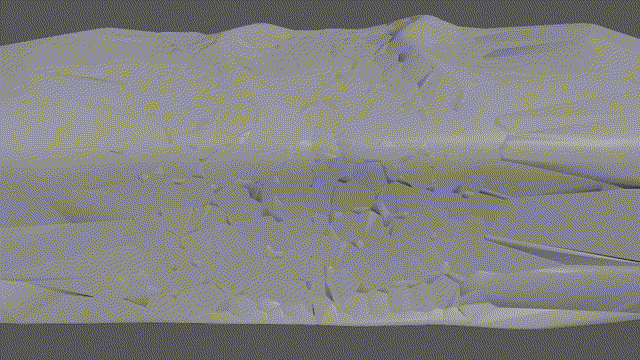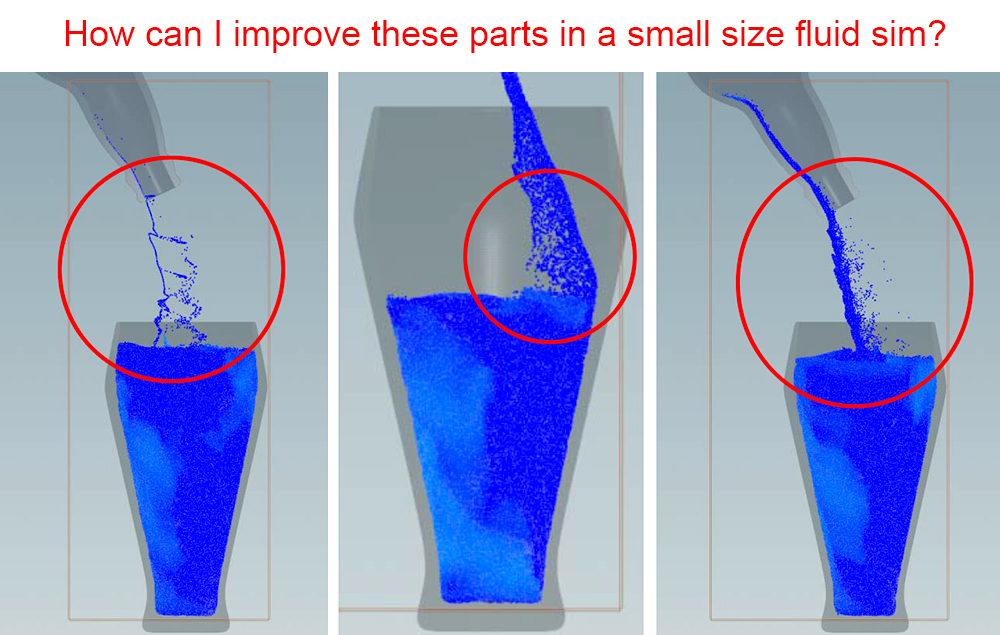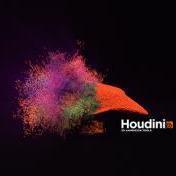Search the Community
Showing results for tags 'surface tension'.
-
I came across this effect on behance and I wanna remake it , I'm still a a beginner , so bare with me , I made a classic Flip setup with gas stick on collision and surface tension , I animated the viscosity and surface tension I also added some negative divergence to make the fluid implode a little ( it did gave a good effect at the beginning so I stuck with it , idk if its a good idea ) . I wanna get a natural tear from the start and these small strands , mine feels elastic . Ref Mine any help will be appreciated . caramel_tear_test01.hipnc
-
Why surface tension utterly useless in Flip? What's the issue: Fliptank initial, using narrowband. If surface tension enabled, the entire surface is full with artifacts. It actually looks it raining onto the surface. Does anyone have a solution for this? What I already tried; Playing with the substeps playing with the grid scale playing with the jitter scale on the fliptank source Tried with and without opencl Here are two tests, one with surface tension enabled and one without it. https://drive.google.com/file/d/1W3sYyYcXctdzkAvncXZqQRDl2tDAjtLY/view?usp=sharing https://drive.google.com/file/d/1msCtg_OXd7_ej0EyjDYm078Lri1JIJQL/view?usp=sharing
- 7 replies
-
- jitter
- surface tension
-
(and 1 more)
Tagged with:
-
Hello, In a small-scale FLIP-Fluid simulation, I need to improve the flow of fluid particles, so I tried these settings: 1) FlipSolver -> Particle Motion-> Reseeding -> Surface Oversampling = 20 2) FlipObject-> Particle Separation = 0.01, Particle Radius Scale = 0.66, Grid Scale = 0.8 3) FlipSolver -> Volume Motion -> Velocity Transfer -> APIC(Swirly) 4) FlipSolver -> Volume Motion -> Surface Tension = 20 5) FlipSolver -> Substeps Tab -> Min Substeps=10, Max Substeps=20 6) I add a POP-Drag node (Air Resistance = 1) to the simulation. But the result is not that satisfying! How can I improve it? Thanks for helping. FLIP_Fluid.mp4
- 3 replies
-
- flip fluid
- reseeding
-
(and 3 more)
Tagged with:
-
Hi guys, How can I apply different “Surface Tensions” to two parts of a FLIP-Fluid simulation? I tried to use the "Gas Surface Tension", but there is no attribute name tab or particle group name tab! I think some nodes like "SOP Scalar Field" or "Scalar Field" should be used to introduce the selected particles, but I don't know how to... Thanks for helping. Surface Tension.hip
- 2 replies
-
- surface tension
- flip-fluid
-
(and 1 more)
Tagged with:
-
Can somebody please help me with this surface tension problem. I have a scene and i want a different surface tension to apply to different group as show above. I want the group 1 to have higher surface tension and group 3 to have a lower surface tension but my setup is not working . SurfaceTension.hipnc
-
Hello forum! I'm trying to develop a specific effect where I try to source multiple "blobs" into a popfluid or flip setup and then trying to keep them separated through the simulation. As I already learned there is no option to have the surface tension handling multiple surfaces/volumes - so I'm looking for a solution that bypasses/hacks that. My current idea is a VEX or popvop solution where I find the nearest point, check if they are sharing the same class attribute they inherit when sourced. then either attract the point (if sharing same class attrib.), or repell (if they are not sharing the same class attrib.). I was wondering if someone had been doing something similar and could share some thoughts on this (or another) approach. Just wanted to make sure I'm not missing something obvious/simple before I dive in. Like Constraints, or micro solvers that could be helpfull, etc. Any hints are appreciated. Thank you very much! I've attached a little sketch to help understand what i'm trying to achieve.
-
I am trying to achieve the effect of having a solid piece of geometry sitting as a fluid, being brought in by either volume source of pop source. This initial piece just has fluid ripples. The second part is I have emitters in the same dop network that are there to create a dripping effect. So it looks like this liquid that is holding shape is dripping. The problem is that I cant seem to create independent surface tension for the two separate sources. If I increase the surface tension to what I need then the main piece of geometry gets washed out. I have been looking for a solution to this but nothing comes up for Houdini 18
- 2 replies
-
- sim
- simulation
-
(and 4 more)
Tagged with:
-
I am working on a shot where a very viscous fluid hits a character. Everything is working great on the sim and giving me look I need, but I was wondering if I could add a "stretch limit" to it somehow. Like "if it stretches by x amount, break it up into smaller pieces" without losing the viscosity much or getting it back after the breakup. I am not sure what attribute I could reference for that (if there is one). Help me odforce, you're my only hope.
-
- flip
- houdini 17.5
-
(and 2 more)
Tagged with:
-
hey houdini users, i'm doing a flip simulation for strawberry falling into chocolate but i cant figure out the right surface tension for viscous fluid and i don't know how houdini calculate Surface Tension or how to find the relation between liquid mass-density and surface tension ? and also does houdini calculate it in millinewton per meter ?
- 2 replies
-
- surface tension
- houdini
-
(and 2 more)
Tagged with:
-
hey houdini users, i'm doing a flip simulation for strawberry falling into chocolate but i cant figure out the right surface tension for viscous fluid and i don't know how houdini calculate Surface Tension or how to find the relation between liquid mass-density and surface tension ? and also does houdini calculate it in millinewton per meter ?
-
- surface tension
- houdini
-
(and 3 more)
Tagged with:
-
Hey Folks, I recently heard about Yannik F.'s Q-Solver Plugin for Realflow (275$) which looks really promising for small-scale liquid-simulations (good surface tension, sheeting, etc.) In my opinion even better than some custom fusionCIS stuff). What do you guy's think about it? (There's a lot more RnD stuff on Yannik F's Vimeo-channel) Annother Example: Release-Notes: https://www.youtube.com/watch?v=5Ud8qBa35r8 I'm (still) wondering if something like this is possible in Houdini. I know that Alejandro Echeverry is working on some similar stuff (http://forums.odforce.net/topic/18111-flip-smorganicsheeter-effect/) , but his tool is to my knowledge not yet finished and available for public use. Is there something similar in H? I did some small-scale stuff a few weeks ago, it turned out ok, but the results couldn't get close to the q-solver stuff - even with a surface tension microsolver attatched to my flip-solver. Some the discussion regarding my project and the topic can be found here: http://forums.odforce.net/topic/22272-how-to-emit-additional-small-droplets-from-a-water-drop-crown-splash/. I'm courious what you think!
-
HI Did anyone know how to use those .cpp .h file? in vs always warring somehow...and i also want to put those scriot into houdini mayabe need translate to vex did anyone done this before? Thankyou! SPH.zip
-
Hi Guys, I'd like to know a way to control different forces, based on some attributes. I find is very easy to control Pop Forces based on position or velocity or Cd attributes... but I want to have this control using for example Gas Turbulence or Gas Surface Tension to control my fluid... Imagine I have one liquid that is flowing along a curve and after TX > 5 it will increase surface tension and turbulence. How would you do that?
-
This is a WIP of what I've been doing on my spare time. Hope you like it! Comments and Critics most welcome
- 9 replies
-
- 2
-

-
- FLipPaintSpeaker
- CHOP
-
(and 4 more)
Tagged with:


_1.gif.4c9cd459d4e8259744a6b8f30d97a1ad.gif)
.thumb.png.5a1968344742c3a225ec34ee2acbc212.png)








